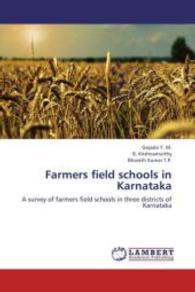Full Description
Child fostering is an age-old and also modern phenomenon whose importance stretches much further than the boundaries of so-called 'traditional' African societies. As a mobile and creative kinship practice, child fostering is of growing importance in the global world as it goes along with other forms of mobility such as migration and transnationalism. The book aims to revitalize the study of fostering by situating the issue in more recent theoretical approaches to kinship. It also examines what functionalist and structuralist theory may still contribute to the understanding of child fostering. Historical and recent child fostering practices in several West African countries are discussed from the angles of Anthropology, History and Law.
Contents
CONTENTS
List of figures
Acknowledgments
List of contributors
Child fostering in West Africa: introduction
Erdmute Alber, Jeannett Martin and Catrien Notermans
PART I
PERSPECTIVES ON THEORIES
1. A framework for the analysis of parent roles
Esther Goody
2. Adoption, fosterage and marriage
Suzanne Lallemand
3. The transfer of belonging: theories on child fostering in West Africa reviewed
Erdmute Alber
PART II
NEGOTIATING STRUCTURE: PERSPECTIVES FROM ANTHROPOLOGY, HISTORY AND LAW
4. Experiencing father's kin and mother's kin: kinship norms and practices from the perspective of foster children in northern Benin
Jeannett Martin
5. Relating affiliation and descent: brothers' daughters as co-wives among the Bulsa in northern Ghana
Barbara Meier
6. Children coming and going: fostering and lifetime mobility in East Cameroon
Catrien Notermans
7. The promises of shared motherhood and the perils of detachment: a comparison of local and transnational child fostering in Cape Verde
Heike Drotbohm
8. Disputes over transfers of belonging in the Gold Coast in the 1870s: fosterage or debt pawning?
Cati Coe
9. Child adoption and foster care in the context of legal pluralism: case studies from Ghana
Ulrike Wanitzek
Index







